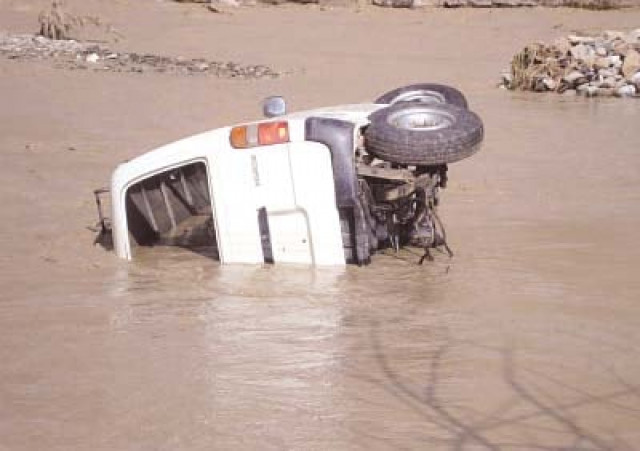One year later: Pakistan’s post-flood blues
Survivors still struggling to rebuild their lives as monsoon season approaches

Nearly one year after devastating floods swamped vast tracts of land across Pakistan, affecting over 20 million people, many survivors are still struggling to rebuild their lives as this year’s monsoon season is about to start.
The first monsoon rains of 2011 have started falling, according to the Meteorological Office, and this is raising anxiety. “We have been able to repair our badly damaged home, but we are still afraid of what may happen now that the rains have begun,” Ahmed Daud Khan, a resident of Nowshera, told IRIN.
He has good reason to be afraid. Last week, flash floods killed seven people in the South Waziristan after heavy downpours led to houses collapsing.
Early this month, Ahmed Kamal, spokesman for the National Disaster Management Authority (NDMA), told the media in Islamabad that the Authority had worked out a contingency plan to tackle any new flood emergency. “NDMA is following two plans for floods, including a plan for a worst-case scenario under which a maximum of six million people can be affected, and a likely scenario under which 2.2 million people can be probable victims,” he said.
But many remain skeptical. “My fields were destroyed, and my house reduced to sticks of timber, and my own wrist broken while trying to save my family,” said Azeemullah Khan, a villager in the Charsadda District. “I am still struggling to earn a living or just put food on the table. Some NGOs helped us in the beginning, but then we were left on our own. The words of government officials mean nothing to me.”
Support still needed
Locals in Lahore told IRIN that rehabilitation of the affected areas has started, but most areas are still without basic infrastructure. Similarly, the Watan Card scheme that the government started, to support those affected, has not helped many people, especially widows who were unable to get any money because they did not fulfill the “head of the family” requirement.
“People want jobs,” Oxfam country director Neva Khan said in a press statement. “They are not looking for handouts. They want to work their way out of poverty and rebuild a better life than before. They are calling for food they can afford, health care when they are sick, and somewhere to live - the most basic of basics.”
Last week, UN Emergency Relief Coordinator Valerie Amos warned: “Families affected by the floods continue to need support to rebuild their livelihoods. The 2011 monsoon is about to start and up to two million people are again at risk from flooding, partly due to lack of funds for reconstruction.
“Major efforts are needed immediately to reduce the vulnerability of these families and implement urgent recovery and flood preparedness work on river banks, irrigation channels and other infrastructure.”
“The [2010] flood had a severe impact on people’s homes, livelihoods and assets,” said a government assessment report: “Most people do not know when they would be able to resume their livelihoods.”
The floods, it noted, wiped out about 2 per cent of Pakistan’s annual growth rate and “inflicted a massive damage” of US$10 billion on the economic infrastructure.
“The areas affected by floods were consistently lagging behind in terms of socio-economic and educational indicators as compared to the areas unaffected by the floods,” the report said. “The loss to infrastructure and livelihood sources will push them behind further. The people most severely affected were predominantly small farmers and unskilled labourers.”
At least 1,200 people died in the floods, the world’s second worst in 10 years, according to the Belgium-based Centre for Research on Epidemiology of Disasters.
According to the UN’s Amos, more than $600 million is still needed to support early recovery activities including rehabilitating water wells, refurbishing the primary health care system and rebuilding schools.
“I am extremely concerned,” said Fahin, a Federal Investigation Agency official, “that the lack of funds is preventing the pre-positioning of necessary medical supplies and the continuation beyond July of the district level Disease Early Warning System.”
Published in The Express Tribune, July 14th, 2011.


















COMMENTS
Comments are moderated and generally will be posted if they are on-topic and not abusive.
For more information, please see our Comments FAQ